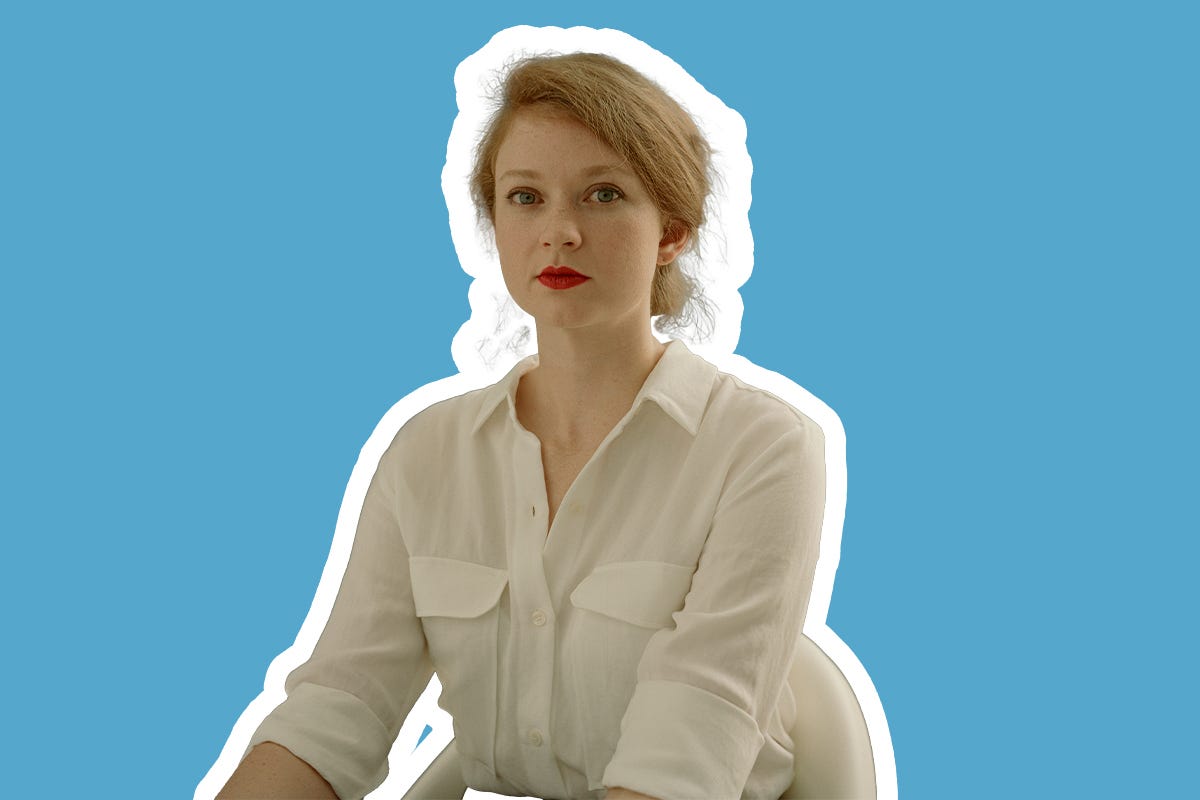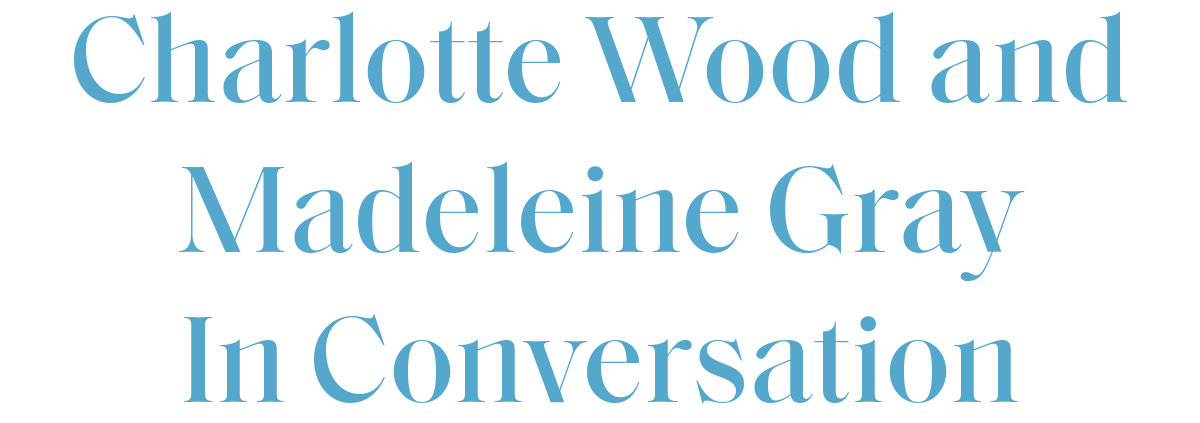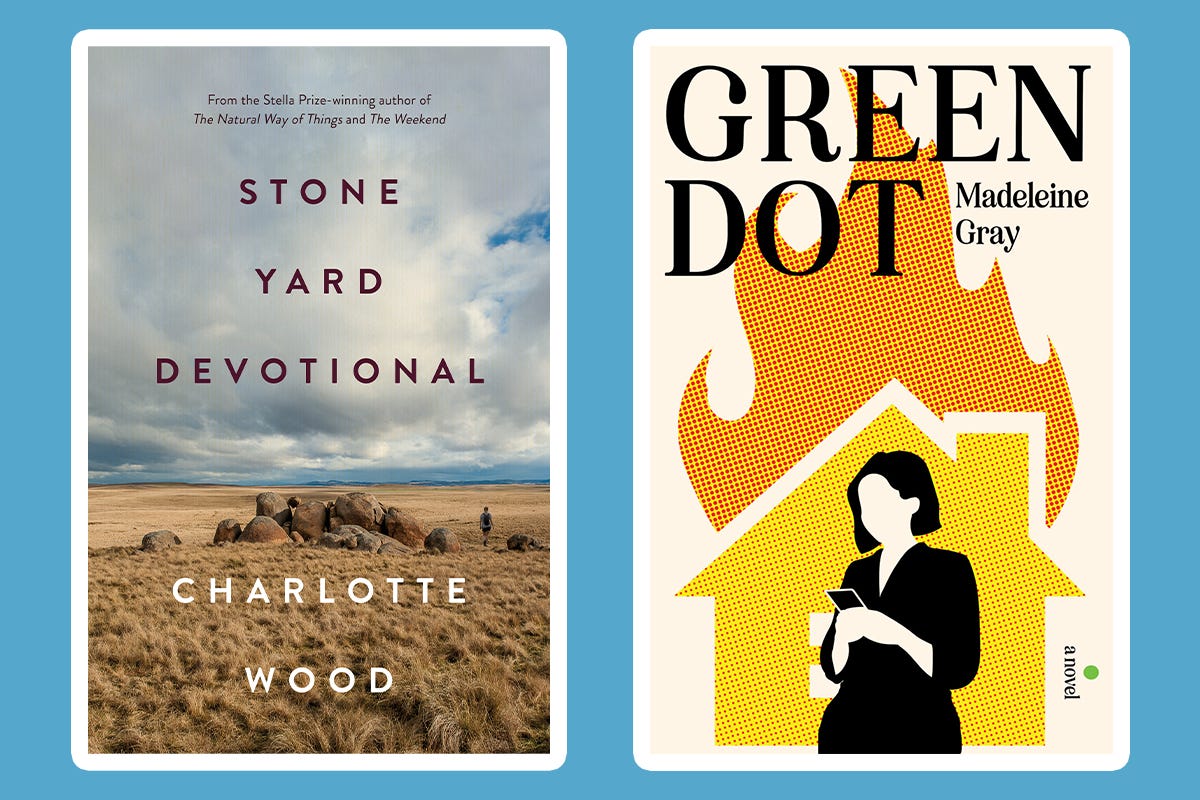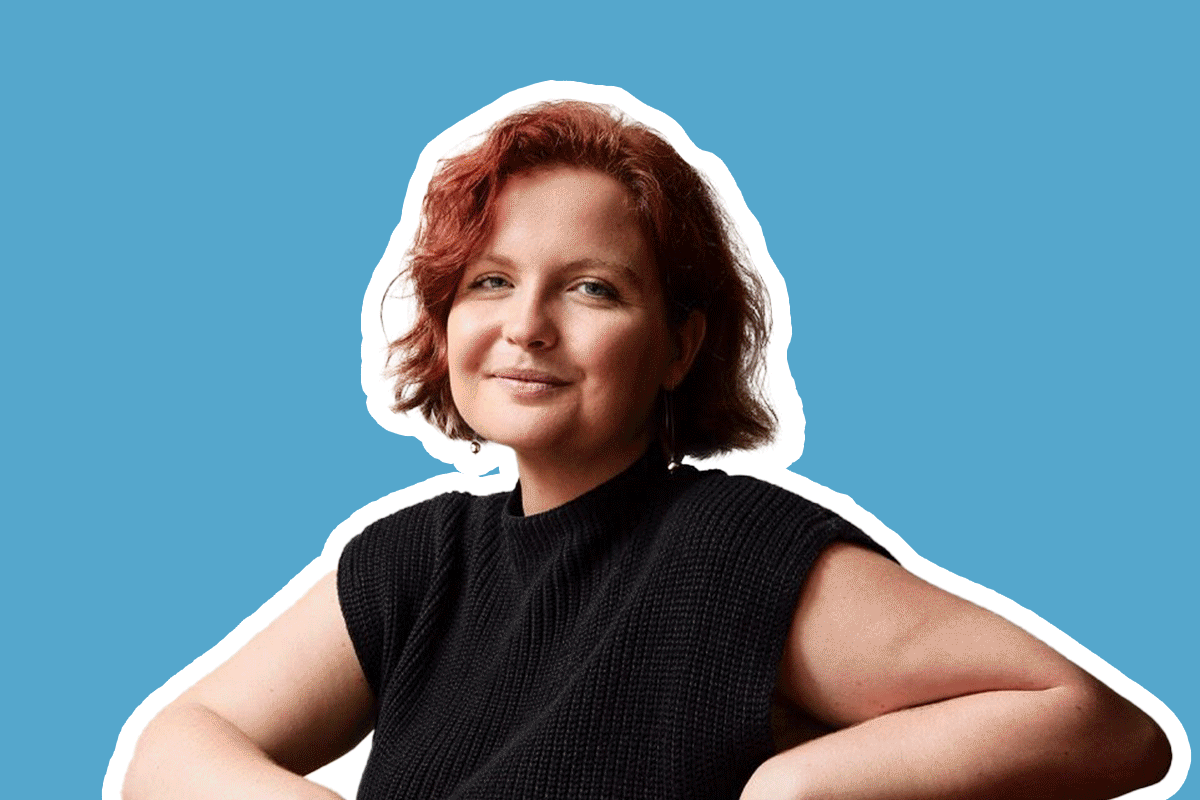Charlotte Wood and Madeleine Gray In Conversation
The authors of 'Stone Yard Devotional' and 'Green Dot' compare notes on social media, touring, and creativity
News & Reviews Magazine
This article is part of our December edition. Read the editor’s letter to see what other fantastic writing has just been published. If you’re annoyed that it’s paywalled, then that means you wanted to read it, which means you value it. These writers get paid for what they do because their work is valuable. If you like that this type of independent media exists, please back it!
The piece you’re reading now is by News & Reviews founder and editor, Bri Lee. Bri writes a regular edition of News & Reviews every week. Subscribe to get it in your inbox Wednesdays at 5pm Sydney time.
A few months ago I met up (IRL) with Charlotte Wood and Madeleine Gray. I was recording an in-conversation between the two of them for a magazine article which was supposed to be published in October and would coincide with their novels coming out, but it has yet to materialise. I pitched that other piece as a sort of ‘Living Legend Meets Buzzy Debut’ thing, which it definitely is, but there was also this other really chewy and interesting conversation leftover. (We spoke for over an hour; many thousands of transcribed words.) With their generous permission that delicious overflow appears here.
Charlotte Wood’s latest novel is Stone Yard Devotional, and Madeleine Gray’s debut is Green Dot.
Bri Lee: I want to ask you both about technology. Specifically, like, smartphones and social media. Because Charlotte, your work is deliberately removed from all of that. The protagonist has exited the world of emails and messages. There are a couple of references to her previous work, but she's not on her phone throughout the day like most of us are.
Charlotte Wood: And the point of her being out there with the nuns is to disconnect.
BL: Very much so. But then yours, Maddy, is in and of that world. Every bit of it. The overarching themes and issues, but also the quotidian and everyday.
Madeleine Gray: Yep.
CW: And the heartbreaking thing about knowing when other people are online—with the green dot.
BL: Exactly.
MG: I mean, obviously, the book is called Green Dot. It’s literally about seeing someone is online and perhaps they're not responding to you. And the yearning that is always involved in constantly knowing that someone is accessible to you, but perhaps, doesn’t want to be. And also just the physicality of constantly holding your phone. I really wanted to get that through in the book. We all have RSI from holding the phone like it’s a totem, like a teddy bear or some kind of comfort object, but that comfort object can also destroy. I think it’s the case for all relationships, that phones and social media connect people, but particularly for this book, and this relationship, it’s an affair, it’s in secret… so the best possible way to communicate with someone is via a device that emits no noise, that can be on your person at all times. I really wanted capture the monotony of constantly checking technology to see if someone’s around, and how that physicalises the yearning.
BL: Do you feel like you have to make a decision at the outset that you will or won’t have smartphone use?
CW: Well, this book is set in this closed order of nuns. My narrator is going there to get away from everything, you know, one of the epigraphs is Nick Cave saying ‘I felt chastened by the world.’ She’s somehow burnt out, or had some sort of crisis happen, that makes her just go ‘I’m out of here’. So her opting out includes email, phone, whatever—I mean, the place needs some admin to run, but she doesn’t do it. But in my other books, in The Weekend, one of the women is having an affair, so there’s her hypervigilance to that phone contact, her constant her checking. I mean, it’s interesting isn’t how we’ve all become obsessive checkers? Yeah. Which is a kind of symptom of an illness, you know?
MG: Yeah.
CW: I certainly am completely addicted.
MG: No, I wake up in the morning and my first thing is: Where’s my phone? I need to check what’s happened overnight. It’s terrible.
BL: Like the statement I remember most viscerally from The Weekend is the one where like a person uses a phone to humiliate another person. There’s just something in both of your works and in contemporary fiction. It’s either a big part of it, or it’s running away from it.
MG: Sally Rooney is always like saying, ‘I don’t like to have social media in my books, because I feel like it kind of cheapens them or something.’ But she does have a lot of emails. So there is electronic dialogue going on just in a more kind of, I suppose a more literary form. But I just think that if you’re writing about young characters, now, not mentioning social media seems fanciful, and actively obfuscating how we live in the world. I mean, sure go for it. But that just seems odd to me, it reads strangely. So Hera uses social media to reflect reality, and that’s a boring answer, but it’s the truth. I don't know how you can write this kind of novel and not do that.
CW: Sigrid Nunez said something in one of her books about being a writing teacher. And how none of her students ever wrote anything about technology. She’s like, ‘all you do is-’
[Laughter]
CW: -engage with technology, but then you pretend it doesn’t exist in your work.’ Interesting.
MG: I mean, even Hera’s job, which is a comment moderator-
CW: -which is so great!
MG: It’s kind of the epitome of current internet culture where you have to be responsive all the time. People have opinions about everything. I wanted to immediately announce that that was the world we were in.
BL: Versus your protagonist, Charlotte, who admits immediately that she’s like escaping from that. And people resent her for it.
CW: Yeah, there’s a fury people feel towards her, because she just leaves without explaining herself.
MG: She ghosts.
[Laughter]
BL: She ghosts the world.
CW: Yeah.
BL: I wanted to ask you both about a tension your characters seem to feel. They want some kind of connection, and they want to be seen, and they want to be known, but at the same time, they long to disappear from everything and to be never ever perceived and evaporate into nothingness because of the potentially liberating promise of that. Would you say that that’s something that is like recurring in both your works although in very different ways.
CW: Well, I realized towards the end of writing this that my books have tended—for some time—to follow this pattern of being in-the-world or out-of-the-world. So, in The Weekend they were in the world, and they’re engaging with the world's view of older women and whatever, but also wanting to work and be a part of the world. In The Natural Way of Things those girls were taken out of the world. The books before that were in the world, but my second novel was out of the world. And I’ve realised that’s a huge tension in me. Wanting to be a part of society and community engagement, to be with people and in the public space. And also at the same time, absolutely hating that and wanting to not be anywhere visible. For me to write I need to forget about the world. A lot of it is to do with social media, actually. I was on Twitter for like nine years. Obsessively on it. And it really did something bad to me and to my life. To my sense of my … what Rosalie Gascoigne would call, ‘the absolute jurisdiction of the artist’. I got off it after Trump was elected. I just couldn’t be witness to that. I couldn’t cope with it. But also in addition to that, I had started to hate my own self, my voice on Twitter. That kind of thing: ‘Oh, I’ve gotta say something kind of funny and a bit cynical, but not, like, too smart-arsey. But a bit smart-arsey.’ And also, wanting validation all the time for every fucking thought that entered my head. I just grew to despise myself. Not my whole self, but that part of me. Because it was fake. I couldn’t keep it up. I was just kind of exhausted and bored by my own persona online, which was different to my actual self, a person who was much less certain and more confused about things. But also, I realised that before I'd even put words down in a first draft of a novel I could hear sort of Twitter voices: ‘Oh, well, privilege,’ you know, and ‘Who cares about that when people are being bombed in Ukraine?’
MG: Yeah.
CW: All of which is true. But to actually produce art, for me, I’ve got to pretend in a sense that the world has nothing to do with me. So I said, ‘I’m getting off Twitter. Thanks, everyone. See you later.’ And I had all these people say, ‘No, you’re making a big mistake. You’ll lose your profile.’ This was before The Natural Way of Things, and I was like, mate, I haven’t got any fucking profile. But interestingly, it was once I got off Twitter that I wrote the book that became the so-called breakthrough book. I’ve done way better as an author once I got off that obsessive connection to social media. Now I try and guard my privacy a bit more carefully. And if I’m online too much I can feel my sense of self eroding, and eroding, and eroding. And it’s not to do with anybody else. It’s to do with me. It’s an addiction. But these days I’m also much more quickly bored by it all.
BL: When I was in Antarctica it was the first time in my life for at least a decade where we were in a complete blackout for three weeks and it re-set my brain. And I was like, ‘Oh, no.’ Everything they say about attention spans and addiction is true.
CW: I did an experiment for an article, you know, for a feature, just one week with no digital communication at all. And it was really… holy shit, I mean, it was shocking. And I’ve never gone back to that complete absence, but it made me realise what I’d lost by constantly being online.
MG: To your question, Bri, I think the protagonist in my book obviously, desperately wants to be known and perceived in a very earnest way. She’s a very sarcastic character, but she really earnestly wants someone to know and love her for exactly who she is. But at the same time, she has a kind of desire for self-immolation. I was reading this book called The Ferrante Letters, which is four scholars talking about Elena Ferrante’s Neapolitan quartet. And I can’t remember the exact word, but it’s an idea of ‘dissolving into the margins’ that Ferrante’s characters are always trying to do. And that’s something I felt about Hera a lot. As much as she wants desperately to connect, there’s also this other side of her, always peeking through that wants to actually just like cease to exist. Not suicidally, but just perhaps she’d be more at peace in the world. I think part of it does have to do with—when she is perceived by people, and especially men—they put all of their expectations and desires onto her and it’s never exactly who she thinks she is. So she doesn’t like to be seen by others because they see her wrong in her mind. So it’s a constant push-pull. I think we’ve all experienced that.
BL: I feel resentful sometimes and cynical, also maybe defensive… It makes me annoyed that the thing that people want from a writer for the most part is to be really, really good at being by themselves for multiple years at a time. And being completely weirdo introverts that just do this extraordinarily—even on a scale different types of artists who make different types of art—solitary work. And then when you finish, you’re supposed to turn into a completely different human being.
MG: Oh, one that talks.
BL: And is charismatic. With boundless energy and not only willingness, but excitement to like, engage with other be extremely public-facing and there’s just supposed to be this perpetual, like, cycle of energy and exchange between you and the rest of the world. I don’t know if it’s always been like this, but I feel like these days you’re supposed to be completely different creatures.
MG: Yeah. The literary industrial complex.
BL: Do you find it frustrating?
CW: Yeah, I mean, in a way, that’s what this is about, you know, that kind of stuff that we’ve been talking about. Being online is endless exposure. I’m an introvert as a person. I love my friends, I love being with people but I don’t love be constantly publicly available. I actually hate that. And I’m happy to do it for a period, you know, when the book comes out and I want to do that. But, for example, I no longer do book clubs. Because of my experience with clubs, which is like, often really nice people, but sometimes not. Sometimes I’ve felt there’s a kind of expectation that well, ‘I’ve read your book, so you’re obliged to come and talk to me.’ Actually, no. I’m not obliged to have any communication with you whatsoever.
[Laughter]
I used to feel like so fucking grateful that anyone read my book, that I had to be available in whatever way they wanted me, available to their views and their questions. Now, though, I don't feel the same level of obligation, though I do love answering insightful questions about my work.
MG: I have not experienced what you’ve experienced in terms of press over 10 books, and this is my first interview. So no one cares what I think. I saw the Melbourne author Abigail Ulman who wrote Hot Little Hands. She’s great. She did a talk at a writers festival and someone asked her a question and she just said, like, ‘actually I don’t have an answer to that.’ And I just thought that was the most radical thing a person could do. I wrote it down. Yes! Since then, I do not have a take on everything.
CW: And you know what? You do not need to have to have an opinion on everything. After The Natural Way of Things came out I was asked to be on every single panel about violence against women, about misogyny, and I did it for a while before I decided actually, I’m not commentator. I see myself as an artist, even if you might not. And I really hung on to that. Because a lot of the time, I think there’s an anxiety, a cultural anxiety about imagination. People don’t trust imagination. They trust research. And so I know for this book that I’ll get lots of questions like: did I interview nuns for this book? I got questions for The Natural Way of Things: Did I interview people in prison? For The Weekend it was: Did I interview older women? And I’m like ‘no!' I used my imagination.’ I’m an artist, I notice things, I use my imagination, and I make shit up.
[Laughter]
And it’s really weird to me that people are so distrustful of your capacity to imagine something. I think that the tension between being the private introvert that needs a really private world in which to write, and the Public Self… it’s a big tension. I’m really happy to do it for a limited period, and then I’m not doing anymore. It might be a year or something. I mean, with The Natural Way of Things, I could still be talking about that book in public. But after eighteen months or something, I just said ‘I’m doing something else.’ Also I think it's really temperamental thing. Some people really like it.
BL: [To Madeleine] Do you think you will like it?
MG: I’ve interviewed lots of authors for their book launches and stuff, just because I used to work in a bookshop. And I know that you can put in a lot of effort, or you could put it in very little effort, when you’re interviewing people And I would always try and put in a lot of effort but I do see it’s not always financially viable to do so. I think I’ll enjoy the conversations where people are engaged and interested and asking good questions. And when they’re not, I think I’ll fucking hate them.
[Laughter]
CW: It’s true. It does really depend on the questions, but there is something… well, for me, it’s about adrenaline. The older I get, the more it’s about the body and how much I can take. The psyching-up and the coming-down from that, because it is a performance. There is an element of performance in any public engagement. Which doesn’t mean it’s false. And in fact, I think it’s important to, to give that to the audience.
BL: If you’re going to do the event you have to give.
MG: Yeah.
CW: Yeah. But that doesn’t mean it doesn’t take from you. So then you got to find ways of refilling the well. Getting rid of the adrenaline. Ways that are not just getting really drunk.
[Laughter]










I loved reading this and I just finished Green Dot which I enjoyed immensely, mostly as a commentary on millennials and because I found Hera really funny and thoughtful. I also recently read The Weekend on your (many) recommendations Bri and I can’t wait to read more of CW books. I don’t think I’ve ever felt like the characters were as real as I did in that book. Thanks for sharing this with us! Hope your (other) article materialises too!
I received both books as gifts recently & devoured them! It was lovely to read this conversation. Is the full piece available elsewhere yet Bri?